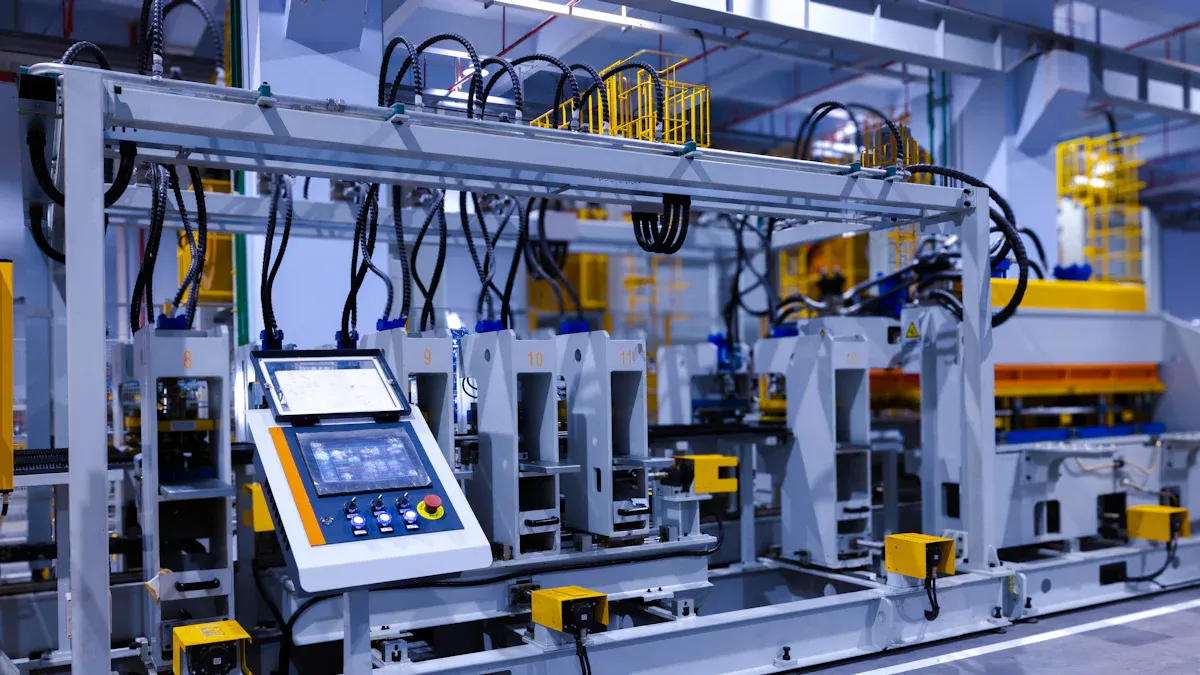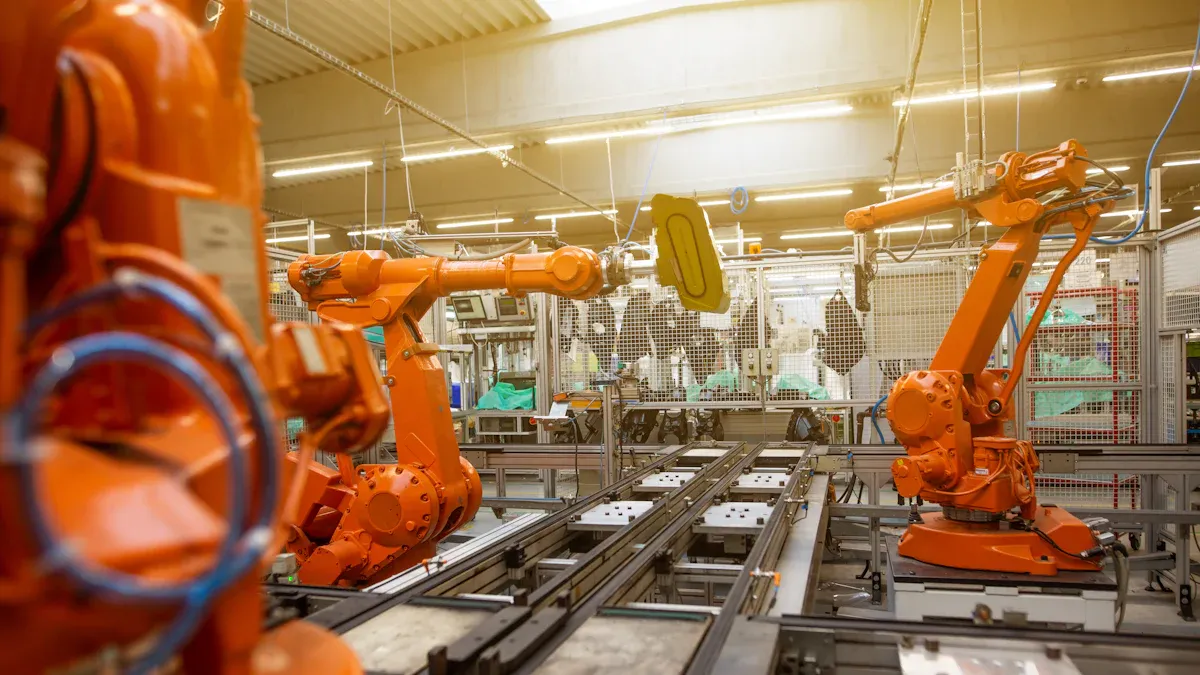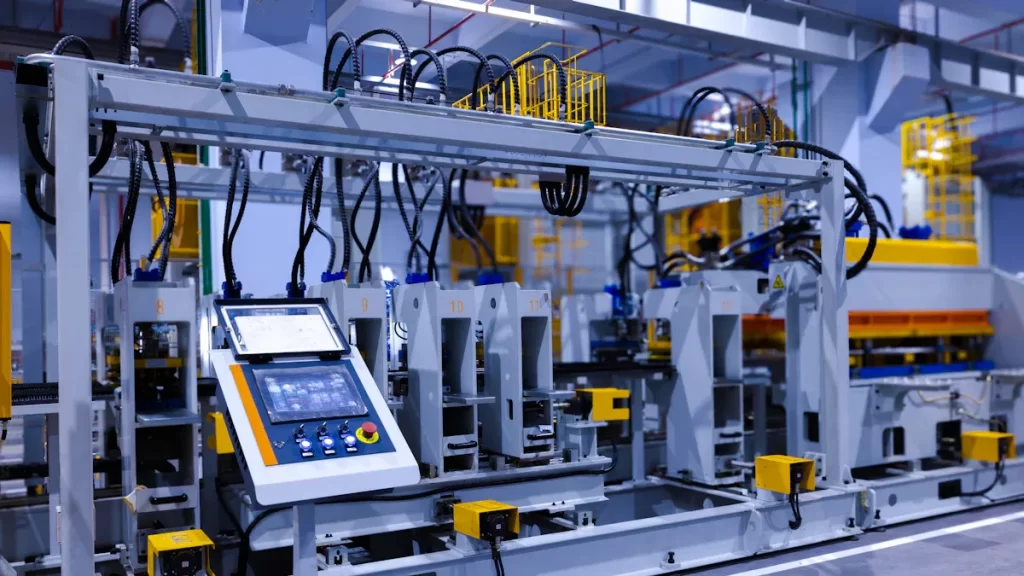
Have you ever thought about how companies meet big demands? They don’t always make everything themselves. Contract manufacturing helps them a lot. It lets companies hire others to make products. This saves both time and money. For example, the market for testing medicines was worth $10.3 billion in 2023. By 2030, it might grow to $16.3 billion. This growth shows the need for better solutions. These include working with tricky drug molecules and making custom medicines. CDMOs help create new ideas and keep businesses competitive.
Key Takeaways
Contract manufacturing helps companies save time and cut costs by hiring experts to make products.
Picking the right contract manufacturer—ODM, OEM, or EMS—depends on what your business needs.
Outsourcing lets businesses grow while experts make sure products are high quality.
Following trends like smart tech and eco-friendly methods can help your business stay ahead.
Asking good questions before choosing a manufacturer helps you find a trustworthy partner.
Understanding Contract Manufacturing
What is Contract Manufacturing?
Contract manufacturing is when companies hire others to make products. It’s like getting help from experts to do the hard work. This way, businesses save time and money. They can also use skills they don’t have themselves.
Here’s a cool fact: the global contract manufacturing market might reach $604 billion in 2023. That’s massive! This shows how important it is for companies to find smart ways to meet customer needs. By outsourcing, businesses can make more products and deliver them faster.
Types of Contract Manufacturers: ODM, OEM, EMS
Not all contract manufacturers do the same thing. They offer different services. Here’s a simple breakdown:
ODM (Original Design Manufacturers): They make ready-to-use products. You can add your brand to these. It’s a fast and cheap way to sell products.
OEM (Original Equipment Manufacturers): You give them a design, and they make it. This gives you more control but costs more because of design work.
EMS (Electronics Manufacturing Services): These experts make electronic parts like circuit boards. They are quick and flexible, great for tech companies.
Each type has a special job. Picking the right one depends on what your business needs.
Why Choose Contract Manufacturing?
There are many reasons to pick contract manufacturing:
Save Money: You don’t need to buy costly machines or buildings. These manufacturers already have them.
Expert Help: They know how to make great products because it’s their specialty.
Adaptability: They can make small or big batches based on what you need.
More Focus: Outsourcing lets you spend more time growing your business.
Contract manufacturing companies also help you stay ahead. They bring new ideas and make sure your products are top quality.
Top Contract Manufacturing Companies by Industry

Leading Electronic Contract Manufacturing Companies
In electronics, speed and accuracy are very important. These companies make parts like circuit boards and semiconductors. They produce large amounts while keeping quality high. They can also adjust production to fit your needs.
Big names in this field include Foxconn, Jabil, and Flex. Foxconn makes products like smartphones for top tech brands. Jabil offers full services, from design to making products. These companies use advanced tools to ensure your electronics work well.
Prominent Pharmaceutical and Biopharmaceutical CDMOs
Pharma and biopharma industries depend on CDMOs for help. CDMOs assist with drug creation, testing, and production. In 2023, this market was worth $150 billion. By 2032, it might grow to $250 billion. This is due to the need for special drugs and biologics.
Top CDMOs include Lonza, Catalent, and Samsung Biologics. They handle tricky drug molecules and follow strict rules. Outsourcing to them saves time and ensures top-quality products. You can focus on new ideas while they manage production challenges.
Top Manufacturers in Consumer Goods and Retail
In consumer goods, speed and cost matter most. These manufacturers make large amounts quickly and affordably. They also offer complete solutions, from creating formulas to packaging.
Li & Fung and Amcor are leaders here. Li & Fung helps brands get products to market faster. Amcor creates smart packaging that looks good and works well. Working with them makes your process smoother and your products better.
Key Players in Automotive and Aerospace Manufacturing
In the automotive and aerospace fields, precision is very important. These industries need manufacturers who can handle tough designs. They also require high-quality results to stay competitive. Advanced tools and smart processes are key to their success. Here are some top companies making a big impact:
Recent Updates | |
|---|---|
Zollner Elektronik | Adding more services to meet growing manufacturing needs. |
Celestica | Bought a tech company to improve electronic manufacturing. |
Flex | Using new technologies and automation to work faster. |
Jabil | Putting money into smart tools to change services. |
Benchmark Electronics | Working on eco-friendly projects to address environmental issues. |
Compal Electronics | Joining green projects to stand out in the market. |
Quanta Computer | Investing in smart tools to match customer needs. |
Sanmina | Changing plans to stay strong in a changing market. |
Foxconn | Using advanced tools to speed up work and save time. |
Hon Hai Precision Industry | Adding automation to grow faster in the market. |
These companies are leading with smart and eco-friendly ideas. They set high standards in manufacturing. If you’re in these industries, working with them could help your business grow.
Notable Food and Beverage Contract Manufacturers
The food and drink industry is growing fast. Contract manufacturers help keep stores full of products. They handle making and packing, so you can focus on your brand. Here are some key facts about this industry:
In 2023, it added over $534.3 billion to the economy.
Meat processing was the biggest, making up 26.2% of sales in 2021.
Dairy products made up 12.8%, and drinks were 11.3% of sales.
This industry also gives jobs to nearly 3.5 million people. Beverage production is growing quickly, especially in Midwest states. These areas focus a lot on food and drink manufacturing.
If you need contract manufacturers here, there are many choices. They can help you make more products and work better. With their help, you can meet demand and keep customers happy.
Services Offered by Contract Manufacturers
Product Design and Development
Contract manufacturers are experts in making new products. They help turn your ideas into real items. Whether it’s a gadget or medicine, they make sure designs are smart and useful.
For example, companies like Klarna and Vodafone show how good design helps businesses grow. Tools like the Product Usability Index show how happy customers are with well-made products. By working with these manufacturers, you can focus on your ideas while they handle the details.
Here’s how they succeed:
They listen to customer feedback to improve designs.
They make sure products are always in stock.
They create designs that stay useful for a long time.
With their help, you get great products that match your goals.
Prototyping and Testing
Before selling a product, you need to make sure it works. Contract manufacturers make test versions, called prototypes, to check how well your product performs. This step finds problems early and saves money.
Testing also copies real-life use to see if the product works as planned. For example, engineers use tools and hands-on methods to find flaws. They also check if the product follows rules and standards.
Here’s why testing matters:
It proves your ideas work and meet user needs.
It removes bad ideas early in the process.
It collects user opinions to make products better.
By testing and prototyping, you can create products that customers love.
Full-Scale Production and Assembly
When your product is ready, it’s time to make lots of it. Contract manufacturers are great at mass production. They use advanced machines to make many items quickly and cheaply.
Making more products lowers the cost of each one. But keeping quality high is very important. Contract manufacturers check every product to fix mistakes fast.
Here’s why large-scale production works well:
Advantage | What It Means |
|---|---|
Making more items reduces the price per product. | |
Faster production | Smart machines make products quickly and save money. |
Quality checks | Every product is tested to meet high standards. |
With their skills, you can grow your business and deliver top-quality products.
Supply Chain and Logistics Management
Handling supply chains is like solving a big puzzle. Contract manufacturers solve this for you. They manage everything from materials to delivery. This saves you time to grow your business.
Companies use KPIs to check how well things work. Here are some key ones:
KPI | What It Tracks | Why It Matters | How to Improve |
|---|---|---|---|
Percentage of orders delivered on time. | Being reliable keeps customers happy. | Simplify steps and improve communication. | |
Order Accuracy | Percentage of orders correctly filled. | Fewer mistakes mean fewer returns. | Use better tools and train workers. |
Inventory Turnover | How often inventory is sold and replaced. | High turnover shows good inventory control. | Plan better and manage stock wisely. |
Freight Cost per Unit | Cost of shipping each unit. | Lower costs help increase profits. | Combine shipments and plan routes better. |
These KPIs help ensure smooth and cost-effective services. For example, tracking order accuracy reduces errors. Watching lead times speeds up processes. By outsourcing logistics, you can meet customer needs without extra stress.
Quality Assurance and Regulatory Compliance
Contract manufacturers focus on making high-quality products. They test and inspect items to meet strict standards. This ensures products are safe and ready for sale.
Following rules is also very important. Manufacturers keep detailed records of their work. This helps them follow laws and avoid problems. For example, they meet research and quality rules to stay compliant.
Choosing a manufacturer that values quality and rules is smart. It ensures your products meet customer needs and industry standards. This protects your brand and builds trust with buyers.
Choosing the Right Contract Manufacturer
Small vs. Large Contract Manufacturers
The size of a contract manufacturer is important. Small manufacturers give personal attention and are flexible. They are good for small orders or special products. Large manufacturers are better for big production needs. They have advanced tools and global connections, which help grow your business.
Think about what you need most. Do you want close teamwork or large-scale production? Small manufacturers feel like partners. Large ones offer more resources. Both have benefits, so pick what fits your goals best.
Things to Think About: Budget, Volume, and Skills
Your budget, how much you need, and their skills matter a lot. First, check how much money you can spend. Look at what other businesses do to plan better. For example:
Learn from successful companies to plan your budget.
Study the market to know prices and demand.
Talk to experts to improve your plans.
Next, think about how much you need to produce. If you need a lot, make sure they can handle it well. Also, check if they are skilled in your industry. Their experience can save time and ensure great results.
Questions to Ask Before Choosing
Ask smart questions before making a deal. This helps avoid problems later. Here are some key things to check:
What It Means | |
|---|---|
Contract Speed | How fast they finish and agree on contracts. |
Partner Reliability | How well they meet promises and avoid changes. |
Risk Management | How often they face delays or fail to deliver. |
Also, ask about their quality checks. Do they follow safety rules like CGMP? Are they always trying to improve? These questions help you choose someone who values safety and success.
Tip: Good manufacturers will answer your questions clearly. This shows they are confident and care about your success.
Trends in Contract Manufacturing

Using Smart Technologies: AI, IoT, and Automation
Technology is changing how things are made. Tools like AI, IoT, and automation make work faster and smarter. For example, Toyota uses IoT to watch its factories live. This helps them fix problems quickly and work better. Companies like Siemens and Boeing also use AI and automation. These tools help them make better products with fewer mistakes.
Electronics manufacturing improves a lot with these tools. AI finds problems before they happen. IoT connects machines so they work together smoothly. Automation speeds up work, helping companies finish faster. Even small businesses can use these tools to stay ahead.
Focus on Being Green and Eco-Friendly
Being eco-friendly is very important now. Manufacturers are cutting waste and saving energy. They recycle and use materials wisely. This helps the planet and saves money too.
Making green products means thinking about their whole life. From making to throwing away, every step counts. Companies now track carbon emissions and set goals to improve. They compare their progress with others to stay competitive. This way, products meet modern eco-friendly standards and attract green-minded buyers.
Benchmarking Aspect | What It Means |
|---|---|
Compare with Others | See how your green efforts match competitors. |
Set Goals | Make eco-friendly plans based on good examples. |
Track Data | Measure emissions to plan better. |
More Demand for Custom Products
People want products made just for them. Did you know 59% of online shoppers like brands that offer custom options? Many will pay more or wait longer for special items. This is changing how companies make things.
Customizing isn’t just about looks. It’s about meeting exact needs. For example, supercar buyers want cars that match their style. Manufacturers meet this demand by offering flexible options. By doing this, companies can attract more buyers and stand out.
Contract manufacturing helps businesses grow and create new ideas. It lets you focus on what you do best while experts make your products. Big companies like Foxconn, Lonza, and Jabil work in areas like electronics and medicine. They offer custom solutions to fit your needs.
Before picking a manufacturer, think about your goals and budget. Also, check how much you need to produce. Asking smart questions helps you find a trustworthy partner. New trends like eco-friendly methods, smart tools, and better data tracking are changing the industry. These ideas make work faster, fix mistakes, and help businesses grow.
Working with the right manufacturer keeps you ahead and ensures your products are top-notch for happy customers.
FAQ
What’s the difference between OEM and ODM?
OEM makes items using your design ideas. ODM creates ready-to-use products you can label as yours. If you want more control, pick OEM. For quicker results, ODM is better.
Tip: Pick based on what your business needs—control or speed.
How can I tell if a contract manufacturer is trustworthy?
Look at their history. Read reviews, check certifications, and see case studies. Ask about how they check quality and meet deadlines. A good manufacturer will explain clearly and show proof of their skills.
Note: Being open and honest shows they can be trusted.
Can small businesses use contract manufacturing?
Yes! Contract manufacturing helps small businesses save on tools and workers. It lets you focus on growing your brand while experts handle making products. Many manufacturers offer flexible options for smaller orders.
Which industries use contract manufacturing the most?
Industries like electronics, medicine, consumer goods, cars, and food use it a lot. These fields need special skills, advanced machines, and large-scale production to meet demand.
How do contract manufacturers keep products high quality?
They follow strict rules for testing and checking products. Many meet standards like ISO or CGMP. Regular checks and detailed records ensure safety and good performance.
Tip: Always ask for their quality certifications before making a deal.
See Also
Comparing Turnkey PCBA And Consignment Manufacturing Approaches
Essential Techniques For Achieving High-Quality PCBA Manufacturing
Simplifying Outsourced Electronic Assembly For Modern Businesses
Choosing Reliable Electronics Manufacturing Services For Your Needs
Locating The Ideal PCBA Manufacturer To Suit Your Requirements





